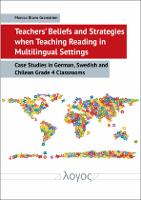Teachers' Beliefs and Strategies when Teaching Reading in Multilingual Settings
Author(s)
Bravo Granström, Monica
Collection
Knowledge Unlatched (KU)Language
EnglishAbstract
Globalization has not only changed our society, it has also had a profound effect on education. Many schools deal with student populations that due to migration have become increasingly multilingual. Politically, few would argue against the importance of multilingualism; rather, it is promoted to the fullest. However, in practical terms the challenges associated with teaching and educational policies have increased manifold as a result of the linguistic diversity among student bodies. Reading is certainly regarded as a key learning skill, however, the question arises as to how the students' life-world multilingualism is taken into consideration. Furthermore, being considered part of teachers' professional competence, teachers' mental processes and perceptions (beliefs) have been the focus in several different academic fields. Previous research suggests that there are significant links between teachers' beliefs and practices. This thesis explores the aforementioned aspects in greater detail, with the overall aim to gain a deeper understanding of teachers' beliefs and strategies when teaching reading in multilingual settings. Using a cross-disciplinary, qualitative research approach, the empirical inquiry is based on case studies within different, linguistically diverse settings. The case studies include classroom observations as well as teacher interviews in German, Swedish and Chilean grade 4 classrooms.


 Download
Download